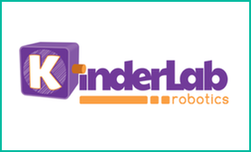
These new prices and features make the research-based, fun robots more exciting and more affordable in time for the holiday season. KIBO is a playful, educational robot toy that engages even the youngest children in active science, technology, engineering, art, and mathematics (STEAM) learning. With KIBO, children ages 4–7 can create, design, decorate, and bring their own robot to life—all without requiring screen time. Young learners create a coding sequence using the wooden programming blocks, scan their sequence with the barcode scanner built into the robot body, press KIBO’s button, and watch their creation go!
Changes to the KIBO product line include:
The KIBO 10 Robot Kit introduces young children to coding with basic programming and motion commands. The KIBO 10 kit has been repackaged without the custom, reusable plastic bin in order to reduce the cost of both the kit and its shipping. The kit is now priced at $199 (a price reduction of $30). Should customers want to purchase the KIBO 10 with its classic packaging, it is available for an additional cost.
The KIBO 15 Robot Kit includes everything in the KIBO 10 and adds an introduction to sensors and conditional programming, plus increased art capability. In addition to a sound sensor, a light bulb output, and additional programming blocks, KIBO 15 includes an art platform that children can decorate with arts and craft materials, turning their robot into any character they can imagine. The new KIBO 15 robot kit (which replaces the KIBO 14 kit) is priced at $299. A custom, reusable plastic bin is also available for an additional cost.
Mitch Rosenberg, the CEO of KinderLab Robotics, said, “Since the first shipment of KIBOs in 2014, KinderLab has strived to deliver robot kits that convey how much fun it is to create with and explore technology. We developed the new KIBO 15 to introduce some of the most interesting STEAM ideas to the youngest learners. For both the KIBO 10 and KIBO 15 kits, we redesigned the packaging so we could offer them at lower prices. By making KIBO even more affordable, we hope to get these research-based robot kits into the hands of every young child and get them excited about science, technology, engineering, arts and math!"
With KIBO, young children can become programmers, engineers, designers, artists, dancers, choreographers, and writers. The KIBO robot is based on more than 20 years of research in learning technologies and child development at Tufts University, including testing with thousands of children, teachers, and parents.
The redesigned KIBO 10 and the new KIBO 15 are available for purchase on the KinderLab Robotics web store, along with the KIBO 18 for $399 and the KIBO 21 for $499.
For a complete rundown of the features of each KIBO, please see the KIBO comparison chart.
About KinderLab Robotics, Inc.
KinderLab Robotics is the creator of KIBO, a robot kit based on 20 years of child development research, that enables young children to build, program, decorate, and run their own robot. Developed by Dr. Marina Umaschi Bers at Tufts University specifically for teachers, KIBO is used in 54 countries and has proven efficacy in helping kids learn STEAM—and get excited about it! KinderLab offers a complete suite of teaching materials that help integrate STEAM elements into a wide range of curricula, including art, cultural studies, and reading literacy. KIBO is a Winner in the Technology/Preschool category in 2018 Seriously STEM awards as well as numerous other awards. For more information, please visitKinderLabRobotics.com.












